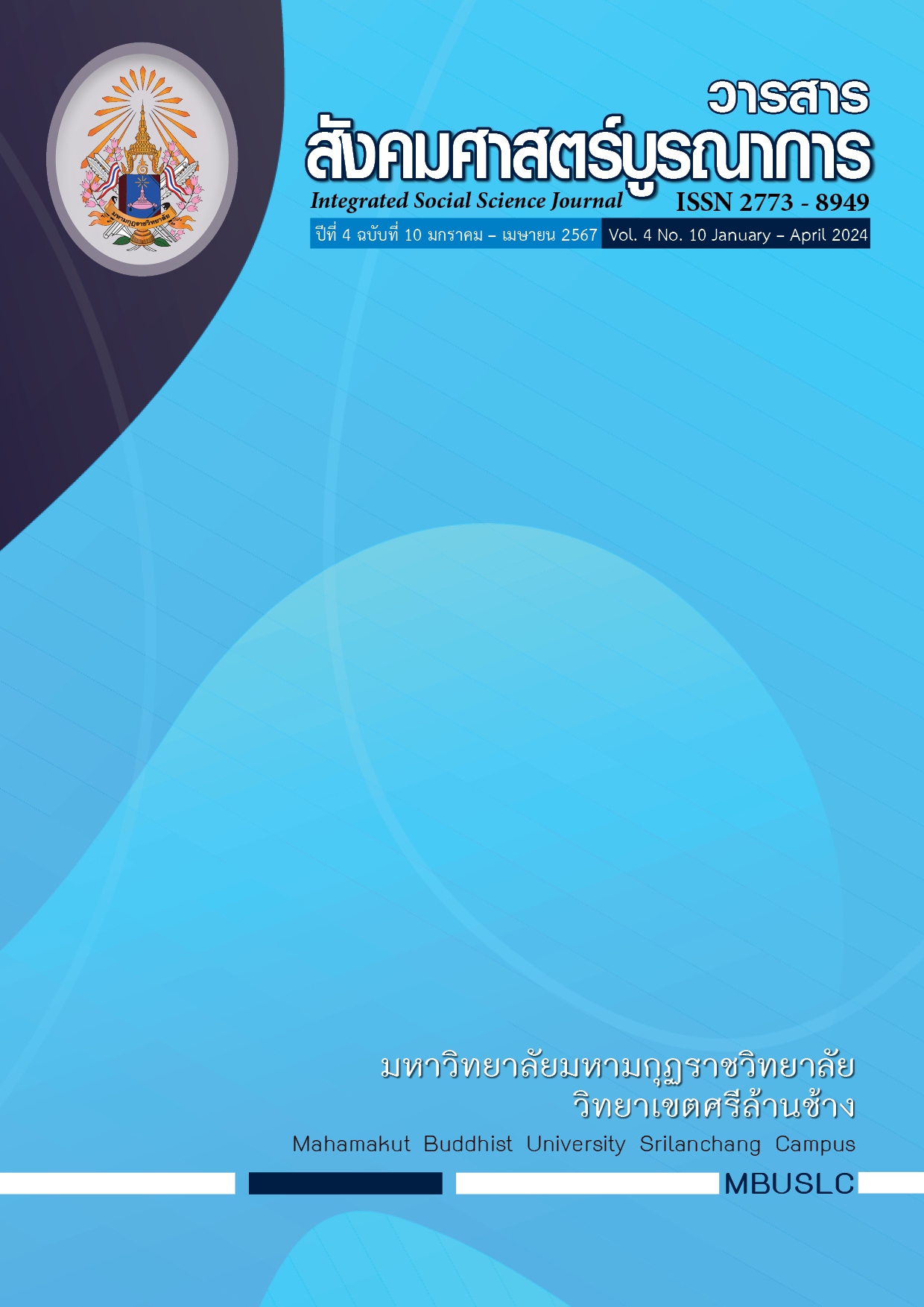EDUCATION MANAGEMENT ACCORDING TO THAILAND 4.0 FOR SUPPORT BUDDHIST TOURISM STRATEGY BY CREATING INNOVATIONS OF HIGHER EDUCATION INSTITUTIONS IN LOEI PROVINCE
Main Article Content
Abstract
The objectives of this research were to (1) study the state of educational management to create innovations to promote Buddhist tourism strategies according to the Thailand 4.0, and (2) develop educational management models to create innovations to promote Buddhist tourism strategies according to the Thailand 4.0 for higher education institutions in Loei Province. There were 3 steps. First step, researchers studied the educational management. Second step, the researchers had developed the educational management model. Lastly, in step 3, the study evaluated the model. The researcher employed a combination of techniques quantitatively, it consisted of (1) evaluating the condition of educational management of lecturers and officers working at Mahamakut Buddhist University, Srilanchang Campus and Mahachulalongkornrajavidyalaya University, Loei Sangha College in Loei province, 102 monks/person (2) assessing the draft educational management model by having 5 academic experts and (3) reviewing student satisfactions with organizing participatory academic service activities integrated with project-based teaching to create innovations to promote Buddhist tourism strategies, 22 students. Besides, an in-depth interview with 9 stakeholders and a group discussion with 15 experts were carried out in obtaining qualitative data. The research instruments included questionnaires, assessment forms, an in-depth interview and a group discussion.
The results of the research highlighted (1) The Environments of Educational Management to Create Innovations to Promote Buddhist Tourism Strategies According to The Thailand 4.0 for Higher Education Institutions in Loei Province. The survey research revealed several conditions of educational management to create innovations to promote Buddhist tourism strategies according to the Thailand 4.0 for higher education institutions in Loei Province overall resulted at high level. Presented through an in-depth interview, It was revealed that the problem was a lack of association between teaching and learning and the correlation between the administration plan and the institutions’ student affairs. Furthermore, the research planned of the institutions did not support tourism research, the institutions received a small amount of research funding. As a result, the institutions’ academic service plan did not cover the goal of developing innovative Buddhist tourism, thus most projects mostly focused on local festivals and traditions. Last of all, there was no certain plan for developing Buddhist tourism and no supporting fund for procedures. (2) The Model of Educational Management to Create Innovations to Promote Buddhist Tourism Strategies According to The Thailand 4.0 for Higher Education Institutions in Loei Province. It consisted of the name of the model: participatory academic service administration integrated with project-based teaching and learning to create innovations to promoted Buddhist tourism strategies and consisted of management schemes, processes, research objectives, and evaluation. An overview of the academic service management model integrated with project-based teaching and learning to create innovations to promote Buddhist tourism strategies showed that there was a high level of consistency when considering each component. The study discovered that in terms of processes and administration, the average level of consistency was at the highest level followed by, the component with the lowest average value which was the objectives. (3) The Experimentation with A Participatory Academic Service Administration Model Integrated with Project-Based Teaching to Create Innovation to Promote Buddhist Tourism Strategies. The process consisted of 2 steps: preparation and planning which the process comprised of 2 activities 1) the tradition of covering the pagoda, 2) improving the landscape around Phra Bang Mueang Loei. (4) The Satisfaction of the Experimental Group with the Learning Activities. In general, it was at a high level: when considering each aspect could be sorted from highest to lowest as follows; input factors for organizing activities, project results, quality according to objectives, contextual aspect of the project, and the aspect with the lowest average is the process (during the process of organizing activities.
Article Details

This work is licensed under a Creative Commons Attribution-NonCommercial-NoDerivatives 4.0 International License.
บทความที่ได้รับการพิจารณาจากคณะกรรมการผู้ทรงคุณวุฒิและเผยแผ่ในวารสารฉบับนี้ เป็นทัศนคติและข้อคิดเห็นส่วนบุคคลของผู้เขียนแต่ละท่าน ไม่ถือว่าเป็นทัศนะคติและความรับผิดชอบ
ของบรรณาธิการ
บทความ ข้อมูล เนื้อหา รูปภาพ ฯลฯ ที่ได้รับการตีพิมพ์ในวารสารสังคมศาสตร์บูรณาการ ถือเป็นลิขสิทธิ์ของวารสารสังคมศาสตร์บูรณาการ หากบุคคลหรือหน่วยงานใดต้องการนำทั้งหมดหรือส่วนหนึ่งส่วนใดไปเผยแพร่ต่อหรือเพื่อกระทำการใด ๆ จะต้องได้รับอนุญาตเป็นลายลักอักษรจากวารสารสังคมศาสตร์บูรณาการ ก่อนเท่านั้น
References
กระทรวงศึกษาธิการ. (2554). มาตรฐานสถาบันอุดมศึกษา. ประกาศกระทรวงศึกษาธิการเรื่อง มาตรฐานสถาบันอุดมศึกษา พ.ศ. 2554.
จักรกฤษณ์ โพดาพล. (2559, 4 มีนาคม). การพัฒนาการใช้แหล่งเรียนรู้วัดศรีสุทธาวาส พระอารามหลวง จังหวัดเลย. การประชุมสัมมนาทางวิชาการระดับชาติ มนุษยศาสตร์และสังคมศาสตร์วิชาการ ครั้งที่ 1 มหาวิทยาลัยราชภัฏเลย จังหวัดเลย.
จังหวัดเลย. (2563). แผนพัฒนาจังหวัด พ.ศ. 2561 – 2565 (ฉบับทบทวน) จังหวัดเลย. เลย: กลุ่มงานยุทธศาสตร์และข้อมูลเพื่อการพัฒนาจังหวัด สำนักงานจังหวัดเลย.
ทิพย์วรรณ วังตา. (2556). การศึกษาสภาพและแนวทางการบูรณาการกับการจัดการเรียนการสอนกับการวิจัยและการบริการวิชาการแก่สังคม ตามกรอบศึกษาศาสตรมหาบัณฑิต สาขาการบริหารการศึกษา คณะศึกษาศาสตร์ มหาวิทยาลัยนเรศวร. การศึกษาค้นคว้าด้วยตนเอง. ปริญญาศึกษาศาสตรมหาบัณฑิต (สาขาการบริหารการศึกษา). คณะศึกษาศาสตร์: มหาวิทยาลัยนเรศวร.
ธรัช อารีราษฎร์ และวรปภา อารีราษฎร์. (2562). รูปแบบการจัดกิจกรรมการเรียนรู้เพื่อส่งเสริมความคิดสร้างสรรค์เชิงนวัตกรรม สำหรับนักเรียนระดับมัธยมศึกษาตามกรอบแผนการศึกษาแห่งชาติ พ.ศ. 2560-2579 สู่การจัดการศึกษา 4.0. มหาสารคาม: มหาวิทยาลัยมหาสารคาม.
ไพฑูรย์ สินลารัตน์ และคณะ. (2559). การศึกษา 4.0 เป็นยิ่งกว่าการศึกษา. (พิมพ์ครั้งที่ 3). กรุงเทพฯ: โรงพิมพ์แห่งจุฬาลงกรณ์มหาวิทยาลัย.
พรชัย เจดามานและคณะ. (ม.ป.ป.) การพัฒนาการศึกษาภายใต้กรอบประเทศไทย 4.0 สู่ศตวรรษที่ 21. (อัดสำเนา).
วงศ์ระวิทย์ น้อมนาทรัพย์ และคณะ. (2559). แผนยุทธศาสตร์เพื่อพัฒนาการท่องเที่ยวเชิงพุทธศาสนาอย่างยั่งยืนในจังหวัดนครปฐม. ปริญญาปรัชญาดุษฎีบัณฑิต สาขาวิชาการจัดการท่องเที่ยว. วิทยาลัยการจัดการ: มหาวิทยาลัยพะเยา.
ศิวนิต อรรถวุฒิกุล และคณะ. (2560). การพัฒนารูปแบบการจัดการการท่องเที่ยวเชิงศาสนาของจังหวัดราชบุรี. Veridian E-Journal, Silpakorn University, ปีที่ ๑๐ ฉบับที่ ๒ (พฤษภาคม-สิงหาคม ๒๕๖๐).
สาคร พรหมโคตร และคณะ. (2561). การพัฒนาแหล่งท่องเที่ยวเชิงนิเวศวัฒนธรรมภูเตาโปง บ้านบุ่งกุ่ม ตำบลนาหอ อำเภอด่านซ้าย จังหวัดเลย. รายงานการวิจัย. คณะสังคมศาสตร์และมนุษยศาสตร์: มหาวิทยาลัยราชภัฏเลย.
สุพรรณี บุญหนัก, ธนวัฒน์ ชาวโพธิ์, และจักรกฤษณ์ โพดาพล. (2564). การศึกษา 4.0: กระบวนทัศน์การศึกษามุ่งสู่อนาคตประเทศ. วารสารวิจัยศรีล้านช้าง 1(1) เมษายน - มิถุนายน 2564. หน้า 41 – 54.
สำนักงานคณะกรรมการการอุดมศึกษา. (2560). คู่มือการประกันคุณภาพการศึกษาภายใน ระดับอุดมศึกษา พ.ศ. 2557, พิมพ์ครั้งที่ 3. กรุงเทพฯ: ภาพพิมพ์.

